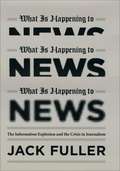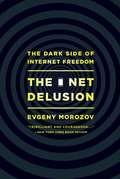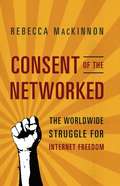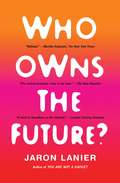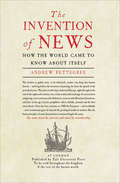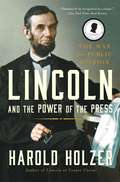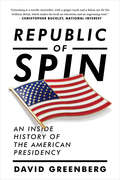Special Collections
Goldsmith Book Prize
Description: The Goldsmith Book Prize is awarded to the trade and academic book published in the last 24 months that best fulfills the objective of improving democratic governance by examining of the intersection between the media, politics and public policy. #award
- Table View
- List View
What Is Happening to News
by Jack FullerAcross America, newspapers that have defined their cities for over a century are rapidly failing, their circulations plummeting even as opinion-soaked Web outlets like the Huffington Post thrive. Meanwhile, nightly news programs shock viewers with stories of horrific crime and celebrity scandal, while the smug sarcasm and shouting of pundits like Glenn Beck and Keith Olbermann dominate cable television.
Is it any wonder that young people are turning away from the news entirely, trusting comedians like Jon Stewart as their primary source of information on current events? In the face of all the problems plaguing serious news, What Is Happening to News explores the crucial question of how journalism lost its way--and who is responsible for the ragged retreat from its great traditions.
Veteran editor and newspaperman Jack Fuller locates the surprising sources of change where no one has thought to look before: in the collision between a revolutionary new information age and a human brain that is still wired for the threats faced by our prehistoric ancestors.
Drawing on the dramatic recent discoveries of neuroscience, Fuller explains why the information overload of contemporary life makes us dramatically more receptive to sensational news, while rendering the staid, objective voice of standard journalism ineffective.
Throw in a growing distrust of experts and authority, ably capitalized on by blogs and other interactive media, and the result is a toxic mix that threatens to prove fatal to journalism as we know it.
For every reader troubled by what has become of news--and worried about what the future may hold--What Is Happening to News not only offers unprecedented insight into the causes of change but also clear guidance, strongly rooted in the precepts of ethical journalism, on how journalists can adapt to this new environment while still providing the information necessary to a functioning democracy.
The Net Delusion
by Evgeny MorozovEvgeny Morozov offers a rare note of wisdom and common sense, on an issue overwhelmed by digital utopians.
Consent of the Networked
by Rebecca MackinnonThe Internet was going to liberate us, but in truth it has not. For every story about the web's empowering role in events such as the Arab Spring, there are many more about the quiet corrosion of civil liberties by companies and governments using the same digital technologies we have come to depend upon.
Sudden changes in Facebook's features and privacy settings have exposed identities of protestors to police in Egypt and Iran. Apple removes politically controversial apps at the behest of governments as well as for its own commercial reasons. Dozens of Western companies sell surveillance technology to dictatorships around the world.
Google struggles with censorship demands from governments in a range of countries--many of them democracies--as well as mounting public concern over the vast quantities of information it collects about its users.
In Consent of the Networked, journalist and Internet policy specialist Rebecca MacKinnon argues that it is time to fight for our rights before they are sold, legislated, programmed, and engineered away. Every day, the corporate sovereigns of cyberspace make decisions that affect our physical freedom--but without our consent.
Yet the traditional solution to unaccountable corporate behavior--government regulation--cannot stop the abuse of digital power on its own, and sometimes even contributes to it.
A clarion call to action, Consent of the Networked shows that it is time to stop arguing over whether the Internet empowers people, and address the urgent question of how technology should be governed to support the rights and liberties of users around the world.
Who Owns the Future?
by Jaron LanierJaron Lanier is the father of virtual reality and one of the world's most brilliant thinkers. Who Owns the Future? is his visionary reckoning with the most urgent economic and social trend of our age: the poisonous concentration of money and power in our digital networks. Lanier has predicted how technology will transform our humanity for decades, and his insight has never been more urgently needed. He shows how Siren Servers, which exploit big data and the free sharing of information, led our economy into recession, imperiled personal privacy, and hollowed out the middle class. The networks that define our world--including social media, financial institutions, and intelligence agencies--now threaten to destroy it. But there is an alternative. In this provocative, poetic, and deeply humane book, Lanier charts a path toward a brighter future: an information economy that rewards ordinary people for what they do and share on the web. grow. It is time for ordinary people to be rewarded for what they do and share on the web. Insightful, original, and provocative, Who Owns the Future? is necessary reading for everyone who lives a part of their lives online.
The Invention of News
by Andrew Pettegree&“A fascinating account of the gathering and dissemination of news from the end of the Middle Ages to the French Revolution&” and the rise of the newspaper (Glenn Altschuler, The Huffington Post). Long before the invention of printing, let alone the daily newspaper, people wanted to stay informed. In the pre-industrial era, news was mostly shared through gossip, sermons, and proclamations. The age of print brought pamphlets, ballads, and the first news-sheets. In this groundbreaking history, renowned historian Andrew Pettegree tracks the evolution of news in ten countries over the course of four centuries, examining the impact of news media on contemporary events and the lives of an ever-more-informed public. The Invention of News sheds light on who controlled the news and who reported it; the use of news as a tool of political protest and religious reform; issues of privacy and titillation; the persistent need for news to be current and for journalists to be trustworthy; and people&’s changing sense of themselves and their communities as they experienced newly opened windows on the world. &“This expansive view of news and how it reached people will be fascinating to readers interested in communication and cultural history.&” —Library Journal (starred review)
Lincoln and the Power of the Press
by Harold HolzerFrom his earliest days, Lincoln devoured newspapers. As he started out in politics he wrote editorials and letters to argue his case. He spoke to the public directly through the press. He even bought a German-language newspaper to appeal to that growing electorate in his state. Lincoln alternately pampered, battled, and manipulated the three most powerful publishers of the day: Horace Greeley of the New York Tribune, James Gordon Bennett of the New York Herald, and Henry Raymond of the New York Times.
When war broke out and the nation was tearing itself apart, Lincoln authorized the most widespread censorship in the nation's history, closing down papers that were "disloyal" and even jailing or exiling editors who opposed enlistment or sympathized with secession. The telegraph, the new invention that made instant reporting possible, was moved to the office of Secretary of War Stanton to deny it to unfriendly newsmen.
Holzer shows us an activist Lincoln through journalists who covered him from his start through to the night of his assassination--when one reporter ran to the box where Lincoln was shot and emerged to write the story covered with blood. In a wholly original way, Holzer shows us politicized newspaper editors battling for power, and a masterly president using the press to speak directly to the people and shape the nation.
Republic of Spin
by David Greenberg
In Republic of Spin—a vibrant history covering more than one hundred years of politics—presidential historian David Greenberg recounts the rise of the White House spin machine, from Teddy Roosevelt to Barack Obama. His sweeping, startling narrative takes us behind the scenes to see how the tools and techniques of image making and message craft work. We meet Woodrow Wilson convening the first White House press conference, Franklin Roosevelt huddling with his private pollsters, Ronald Reagan’s aides crafting his nightly news sound bites, and George W. Bush staging his “Mission Accomplished” photo-op. We meet, too, the backstage visionaries who pioneered new ways of gauging public opinion and mastering the media—figures like George Cortelyou, TR’s brilliantly efficient press manager; 1920s ad whiz Bruce Barton; Robert Montgomery, Dwight Eisenhower’s canny TV coach; and of course the key spinmeisters of our own times, from Roger Ailes to David Axelrod.
Greenberg also examines the profound debates Americans have waged over the effect of spin on our politics. Does spin help our leaders manipulate the citizenry? Or does it allow them to engage us more fully in the democratic project? Exploring the ideas of the century’s most incisive political critics, from Walter Lippmann and H. L. Mencken to Hannah Arendt and Stephen Colbert, Republic of Spin illuminates both the power of spin and its limitations—its capacity not only to mislead but also to lead.
